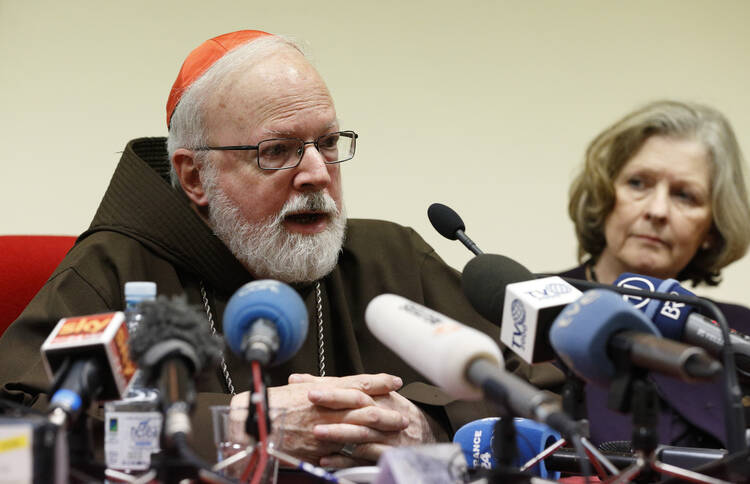Cardinal Sean O’Malley put the question of the accountability on the table of this week’s meeting of the pope with his “Council of Nine” cardinal advisors. His intent is to find a juridical and competent way to deal effectively with bishops and religious superiors who abuse their positions of responsibility in the church, by omission or otherwise, regarding clerics who abuse minors.
Federico Lombardi, S.J., the Director of the Holy See Press Office told this to the press at a briefing in the Vatican, April 15, as the three day meeting (April 13-15) of the G9 with Pope Francis was drawing to a close.
The question of accountability is not a new topic, Lombardi acknowledged, but he indicated that by putting it on the table at the G9 meeting, Cardinal O’Malley is pushing for a conclusion. The Boston cardinal did so in response to the expectations of the Papal Commission for the Protection of Children, of which he is president. Before the meeting, he met with four members of that commission (including two survivors) who expressed their serious concerns over the recent appointment of the Bishop of Osorno, Chile. The cardinal promised to relay their deep concerns to the pope and the four expressed satisfaction in a statement issued afterwards.
In addition to that pressing matter of accountability, Fr. Lombardi reported that the G9 had discussed the methodology they should adopt for their work in 2015 and 2016, when they hope to be able to come up with a draft of the Constitution for the reform of the Roman Curia. The final text could take longer, he said. He would not predict when this might be completed. “I do not have a crystal ball,” he remarked with a smile. Moreover, he noted the pope has yet to establish a team to work on that legal document.
The Vatican spokesman assured everyone that the G9 is moving ahead with all due speed, and will hold three more meetings this year: June 8-10, September 14-16, and December 10-12.
He revealed that the G9 had given much time during their three-day gathering to analyze the input from the 60 cardinals that had spoken on the project for reform of the Roman Curia during the Consistory of Cardinals last February. Their comments focused both on the proposal for two new congregations (“Charity-Justice-Peace” and “Laity-Family-Life”), and on the general principles guiding the entire reform project.
Lombardi recalled that the G9 had approved the Report of the Committee for the Media headed by Lord Patten at their last meeting, and during this week’s session they decided to establish another committee (including some members from the Patten Committee) whose task would be to come up with a concrete plan for the implementation of that report. The pope will appoint the members to this new body.
Finally, Fr. Lombardi confirmed that it is likely that the reform project will be implemented piecemeal, and so the two new congregations (on which there appears to be general consensus) could be established in due course, before there is agreement on the Constitution. The same is likely to be true for the Media project.








